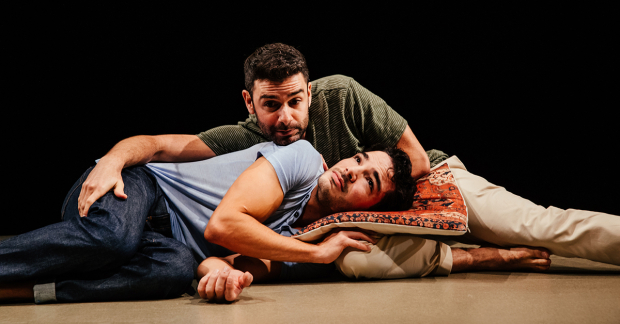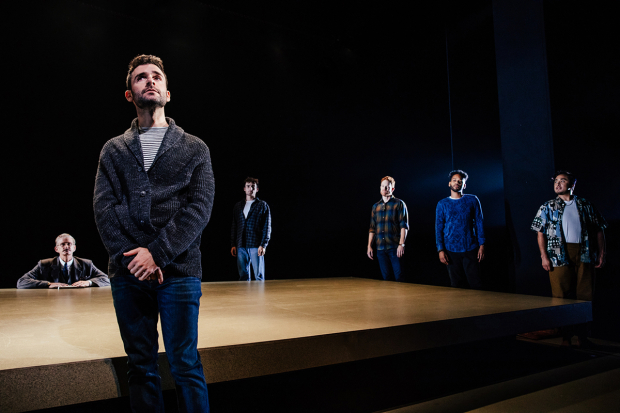Review: A Stirring Los Angeles Production of The Inheritance Boasts a Strong Cast for an Epic Work

(© Jeff Lorch)
The final five minutes in Part 1 of Matthew Lopez's epic Tony-winning The Inheritance, now running at the Geffen Playhouse in Los Angeles, are some of the most gut-wrenching moments in theater. At the performance I attended, the entire audience sat connected — some teary-eyed, some crying — but it seemed everyone was affected somehow by the play's sadness and other-worldly camaraderie. The entire seven-plus-hour production, which is divided into two parts, spellbinds with precise dialogue, rich characters, and an analysis of the United States as a whole.
Taking place in New York during the end of the Obama Era/beginning of the Trump period, The Inheritance follows the disintegration of the relationship of Eric (Adam Kantor) and Toby (Juan Castano) after Toby adapts his first novel into a play, which becomes a success. Toby becomes drunk with accolades and the attentions of the young boy he has groomed to be a star (Bradley James Tejeda). Eric places value only on what he can give and do for people; it's an inheritance he received from years of being told by society that gays matter less. His insecurities, compounded by the devaluing by his selfish lover and the loss of his family apartment in the city, cause Eric to lose direction. But his friendship with a kindly neighbor (Bill Brochtrup), and the eventual legacy of a past mission, impacts his life beyond expectations.
Lopez's sprawling opus takes time with its characters, unfolding slowly over two separate 3-plus-hour programs, but no moments seem wasted or overwritten. Lopez has ingeniously adapted the plotline of The Inheritance from that of E. M. Forster's classic novel Howards End. But Lopez does more than just hang modernity on a century-old book; he re-envisions a world where community passes along nurturing subsequent generations, defying the country's current trend toward a narcissistic, self-involved culture.
Lopez's dialogue is wonderous, both conversational and vibrant in its subtext. None of his characters are pure angels or villains. His antagonists are broken, not evil, and his protagonists make precarious decisions based on fear and insecurities. It is understandable why Lopez ended Part 1 as he did, but it does throw the balance of the two halves off. Nothing in the second part, including the death of a major character, hits that emotional bull's-eye like that climax of the first.

(© Jeff Lorch)
Director Mike Donahue gathers a talented cast. Castano brings pathos to the least empathetic character by highlighting how he's running as fast as he can from his past and his lack of self-worth. He never tries to make the audience to fall in love with Toby, never softens the rough edges, but instead he presents the callow Toby as a lost boy without the wherewithal to forgive himself.
Kantor, the play's epicenter, also permits his character's waywardness to dilute some of Eric's saintliness. Tejeda, an understudy from the Broadway production, brings assuredness to his dual roles of Adam, the young, privileged actor, and Leo, the outcast, drug-addicted prostitute. Though he came late to this production, Tejeda's chemistry with the rest of the cast is palpable and he is stellar in these polar-opposite roles. Tejeda breathlessly exemplifies how Leo and Adam could be the same person, and that only circumstances and family life changed each's trajectory.
Brochtrup, also in two roles — that of the ghostly E.M. Forster encouraging the boys to tell their story, and the ethereal Walter, whose life inspires the characters in many ways — lends an otherworldliness to both roles in his voice and cadence that visualizes both characters as fully fledged human beings, but also presents parables to teach a generation that lost their teachers. Tuc Watkins, as the upper-class Henry, embodies the log-cabin Republicanism that consternates the more political gays. The actor enforces that the ideology makes sense to Henry — that he's not a hypocrite who knows his politics are destructive yet doesn't care, but that he thinks he's on the right side. He plays Henry more naïve than cruel. The rest of the cast play multiple roles, including Toby and Eric's friends, and are impactful throughout the production.
Donahue allows the actors room to flow, so that none of the scenes are dense or stagnant. With a minimalistic set by Jaimie Todd, and a mixture of flamboyant and commonplace costumes by Sara Ryung Clement, the words and the performances always take center stage.
When art taps into something achingly truthful, it has an overwhelming effect on its audience. The Inheritance portrays a society robbed of its elders and desperate for a purpose. It doesn't bring answers, but the hope that answers will come, and that civilization is worth saving.











